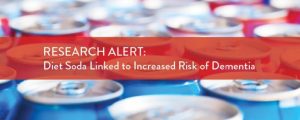
![]()
If it says “diet” it must be good for you, right? At least better than the non-diet version…?
When it comes to swapping out sugary soft drinks with diet soda, most people assume they are
doing their health a favor. This mentality and safety message has been reinforced through
marketing campaigns and has even been endorsed by members of the medical and nutrition
communities. However, new research cast serious doubts on the safety of some of the artificial
sweeteners that are used to replace sugar in diet soft drinks.
New Research
This research, published in the journal Stroke, comes from the lab of Sudha Seshadri, a professor of neurology
at the Boston University School of Medicine and a faculty member at BU’s Alzheimer’s Disease Center. The
authors of this study were interested in whether or not there was an association between the consumption of
sugary beverages and dementia and stroke, so they used data from the well-known Framingham Heart Study to
test if there was a relationship. Using food frequency questionnaires, the researchers divided study participants
into three groups based on their dietary habits—those consuming sugary beverages (including juices), those
consuming sugar-sweetened soft drinks (not including juice), and those consuming artificially sweetened
beverages—and tracked these people for 10 years to see what health outcomes could be associated with their
beverage choices.
The first piece of data reported on in their study was that the prevalence of cardiovascular disease and diabetes
in study participants actually increased with greater consumption of artificially sweetened soft drinks and that it
was lower in the group who consumed sugary beverages.[1] It is possible that those with diabetes and
cardiovascular disease were more likely to consume these drinks, however the authors did factor this into their
analysis. Regardless, this initial finding casts serious doubts about the safety of artificially sweetened soft drinks
and as surprising as it may sound, this isn’t the first study to link artificial sweeteners to the development of
diabetes (more on that later).
Shocking Findings
Perhaps even more shocking is that when the researchers compared those participants frequently consuming
artificially sweetened soft drinks to those consuming none, the risk for developing dementia increased by twofold
and the risk of having a stroke increased three-fold over the ten year follow-up period. Because of the close
relationship between the development of diabetes and dementia, the authors repeated their analysis, removing
those who had developed diabetes. They still found that the consumption of artificially sweetened soft drinks
was related to the development of dementia—and that the development of diabetes was only partially
responsible. Taken together, these observations should make us question the safety of these purportedly “safe”
artificial sweeteners.
This study is not the first to report that greater consumption of artificially sweetened soft drinks is associated
with poor health outcomes. Research published in the journal Nature in 2014 showed artificial sweeteners could
cause prediabetes-like symptoms in certain people, based on the composition of their gut bacteria. Several other large scale studies have reported that greater consumption of these types of beverages are associated with poor vascular health, however, to my knowledge this was the first study to link consumption of artificially sweetened soft drinks to an increased risk of dementia.
What Happened?
There is no way to know exactly what artificial sweeteners are to blame, however the artificial sweeteners that were approved at the time of this study were saccharin, acesulfame, and aspartame, while sucralose and neotame were approved not long after the observational period ended. While no mechanism was investigated in this study, one hypothesis put forth by the authors is that these artificial sweeteners may result in the disruption of the incredibly important microbial ecosystem in the gut—this disruption is known as dysbiosis.
This is a valid hypothesis, as microbial dysbiosis has been implicated in numerous diseases, such as Alzheimer’s, depression, diabetes, obesity, and many other diseases. It’s also possible that when dietary ingredients are determined to be “safe” their effects on the gut microbiota are not considered. Indeed, the late Jack Challem gives a rundown of a well-designed experiment that showed how different artificial sweeteners cause unique disruptions to the gut microbiota in this excellent article.
Not All Sweeteners Are Created Equally
When it comes to non-caloric sweeteners and health effects, they can be divided into two camps: artificial sweeteners (like aspartame) and non-caloric natural sweeteners (such as stevia) that come from plants. Currently it seems that peer-reviewed research is starting to suggest that avoiding artificial sweeteners is advantageous to our health. The non-caloric natural sweeteners may be a great alternative to artificial sweeteners, and research on these products so far has been quite encouraging.[2] Nonetheless, sweeteners should always be used in moderation.
To learn more about different sweeteners and the research on their health effects, you can read “The Definitive Guide to Natural Sweeteners Part 1 and Part 2.”
As far as conclusions that can be drawn from this study go, it seems like removing artificial sweeteners that are made in a lab from your diet is a smart move. If you are concerned about the health of your gut microbiota for whatever reason, consuming probiotics, probiotic-rich fermented foods, and fruits and vegetables is a great way to cultivate the health of these ever important microbes.
References
[1] Pase MP, Himali JJ, Beiser AS, et al. Sugar-and Artificially Sweetened Beverages and the Risks of Incident Stroke and Dementia: A Prospective Cohort Study. Stroke. 2017; 48: 1139-1146
[2] Ruiz-Ruiz JC, Moguel-Oronez YB, Segura-Campos MR. Biological activity of Stevia rebaundiana Bertoni and their relationship to health. Crit Rev Food Sci Nutr. 2017. 57;12: 2680-2690



